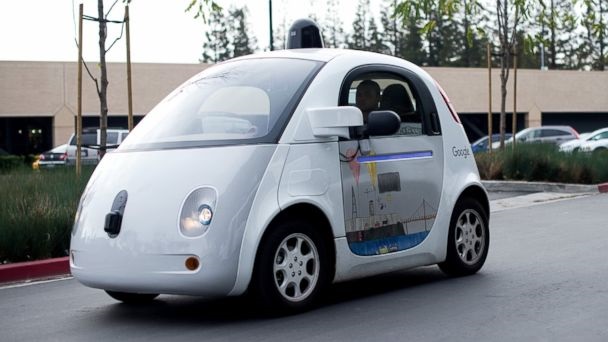Robots are on the point of being used in areas as diverse as taxi driving, construction, manufacturing, journalism and medicine.
 Photo: Grendelkhan (CC)
Photo: Grendelkhan (CC)
A driverless shuttle bus is to be tested by the public in London. The bus will operate on a pathway also used by pedestrians and cyclists, can ‘see’ 100m ahead and will stop if anything crosses its path.
Driverless vehicles are just one development set to have far-reaching implications as greater mechanisation becomes the norm. Factories are increasingly becoming automated, since costs are lower and productivity is higher. Robots are particularly suited to straightforward, repetitive tasks, since they do not get tired and make mistakes. However, automation is far broader in scope than this; the development of artificial intelligence software, which can be applied to a wide range of tasks, will likely replace various activities previously carried out by humans. Robots are on the point of being used – and are already being used – in areas as diverse as taxi driving, construction, manufacturing, journalism, medicine and hospitality.
The impact of these developments is not merely technological. They are social and relational. Some estimates suggest that as much as 40 percent of jobs will be replaced by robots by 2050. Whilst opportunities will inevitably come as a result of advancing technology, potentially giving rise to a new kind of ‘post-services’ economy, in the short term there are bound to be consequences for employment and income – particularly for lower-skilled workers. Governments are poorly equipped to deal with these impacts. Having failed to provide a credible response to the threat of competition from cheap foreign labour, it’s unlikely they will do better when faced with home-grown robots taking their voters’ jobs.
TECHNOLOGY = CHANGE
New technologies always bring change of one sort or another. Since they allow people to do something they could not do before, they fundamentally entail a shift in the power balance.
From a biblical perspective, whilst early Israel did not have to worry about advanced industrial technologies that would render large proportions of the population unemployed, there were major technological developments that brought their own social and relational (and religious) implications. The development of kiln-fired over sun-baked bricks, which allowed the construction of stronger and taller buildings (Genesis 11:3-4). The rise of iron as a material for weapons and farming implements, which conveyed enough of a power advantage to the Philistines for them to prevent the Israelites from using it (1 Samuel 13.19-22). The development of coinage over simpler but more egalitarian forms of money, which moved money firmly into the sphere of the state (Mark 12:13-17).
Over the coming months, the Jubilee Centre will be undertaking further work in this area, seeking to understand how the world will likely change as a result of automation, how this will affect the shape of our societies, families and relationships, and what insights the Bible offers for addressing the profound consequences it is likely to have.
Guy Brandon is the Senior Researcher for the Jubilee Centre.
This article first appeared on the Jubilee Centre website and was republished with permission.

Las opiniones vertidas por nuestros colaboradores se realizan a nivel personal, pudiendo coincidir o no con la postura de la dirección de Protestante Digital.
Si quieres comentar o